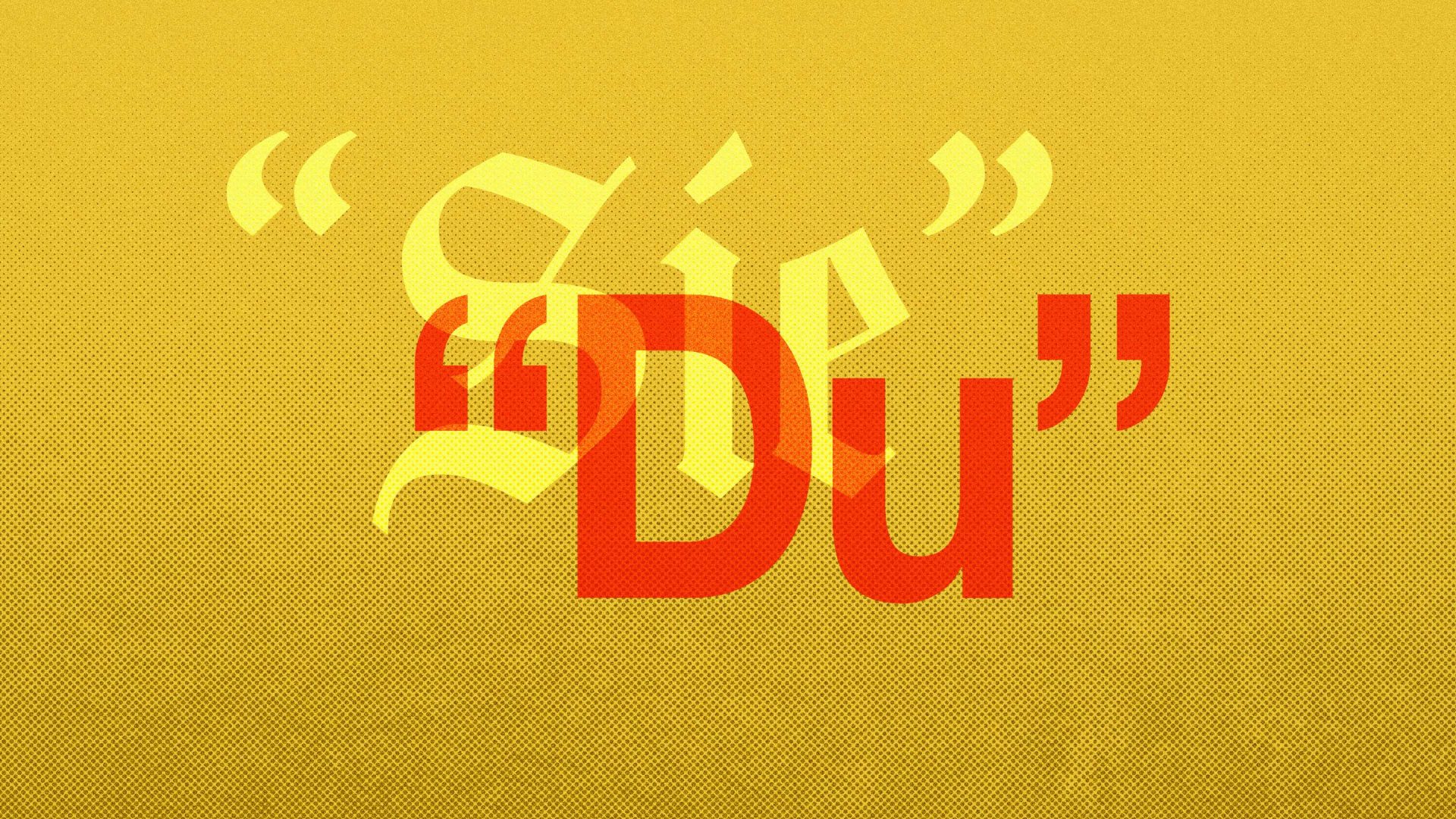I know you hardly think about anything else, but may I just take your mind off gender-neutral pronouns for a minute? Because language matters, and a little German could be of help when negotiating a truce over stealing our sun loungers next holiday season.
Have you ever come across the quote “You can say you to me”? Probably invented by journalists, it was first attributed to bundespräsident Heinrich Lübke (in conversation with the Queen), then to bundeskanzler Helmut Kohl (to Ronald Reagan): “Sie können Du zu mir sagen.”
If you hear this, congratulations, you’ve been offered the Du! It’s the difference between what the French call vouvoyer and tutoyer – the formal and informal versions of “you”. We say siezen (pronounced seetsn, soft s) and duzen (dootsn).
A Du used to stand for closeness and friendship. It is now mercilessly overused. But before I get there, here’s a Du-deep-dive into the many ways this familiar form is used.
Bender Du: after too many beers the boss offers you the Du, you ritually drink in brüderschaft (brotherhood) to consolidate your friendship by intertwining your arms at the elbow and raising your glasses. The next day, your boss calls you Herr Müller again (it is unwise to remind him of the Du).
Mountain-climber Du: When you are 1,700 metres up and your life hangs by a thread, literally, there is no need for formalities.
Children’s-Du: kids typically say “Du, Frau Kaufmann …” to an elderly preschool teacher.
Advertising-Du: Ikea was among the first to address German customers with Du. True, they also call a wardrobe Dombas, a desk Jerker and a table lamp Milf – but the Du has huge influence. If you want your brand to be hip, you go for Du.
Comrade-Du: trade unions, Social Democrats and the like use Du among themselves. Symbolic equality
Chancellor-Du: rare! Unless you are a Social Democrat (see above). Angela Merkel, it is said, used Du with only five cabinet members. Helmut Kohl would call others Du but expect to be addressed as Herr bundeskanzler and Sie. When he offered the Du to Lothar de Maizière, the first democratically elected and last prime minister of the GDR famously replied: “Herr bundeskanzler, I haven’t survived 40 years of GDR-comrade-Du only to be called Du again in the bundesrepublik.”
Express Du: Someone you’ve just met wants to Du you. Achtung! No matter how invasive it seems (or is, in fact) there’s no remedy. Unless you come up with a brilliant excuse that second (like De Maizière), you cannot turn down the Du. It would be monstrously rude.
My partner once made use of this unwritten law. Before introducing him to my mother, then in her late 70s, I prepared him to be addressed as “Oliver” followed by Sie (the so-called Hamburger Sie, a sort of first-name basis at a distance). He nodded. But when my mum opened the door, he beamed at her: “You are about to call me Sie, but let’s just drop that”, catching her completely off-guard. She smiled (and soldiered through per Du).
The different ways of addressing people go back centuries. You used to do it, too – thou (familial) and you (formal) – but then, typically English, decided on the polite version for everyone. We evolved too: While Martin Luther felt compelled to address his son per Sie after the kid finished his Magister studies, until the middle of last century it was just children who would respectfully call their parents Sie.
For the last two to three years of school, German teachers still start to address their pupils with Sie, to acknowledge their maturity.
But the general trend favours the Du, the Sie having already vanished from many office floors. Some sectors are immune: auditors, the justice system, psychotherapists etc keep a professional Sie-distance. But in day to day life the Du is ousting the Sie.
It’s due to an Anglo-American spillover effect, to social media language and HR departments viewing “Du for all” as a synonym for a less hierarchical, modern corporate culture. “You can say Du to me”, jeered at by journalists last century, is now used in corporate email signatures.
The Du will be victorious, although studies show that even Millennials don’t want a Du forced upon them. Victory has a price, however: the Du draws its value from the contrast to the Sie, for the Du to be an emotional upgrade the Sie needs to survive.
The good news for you, wondering how best to address the Krauts: you cannot err. Anything, really anything you say in German, whether per Du or Sie, will sound just lovely. As long as you keep an English accent.




